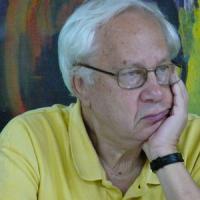
A Chess Incubator
The Soviet Junior Championships traditionally took place in January, during the Winter school break. It was really an incubator of future champions since as far as I know, every single chess star from the former Soviet Union played there at some point of his or her chess career. I played in five of them and the most memorable one for me was Kirovabad 1984. The tournament was deservedly won by the future FIDE World Champion Alexander Khalifman. You can see the decisive game of that championship in one of my previous articles here: http://www.chess.com/article/view/the-fischers-patent
I came only fifth, so why will I remember this tournament my whole life? The reason is that beside the main Champion title under 18 years old, there was a competition for the title under 16 years old. Before the tournament the head coach of the Soviet Junior chess program, Anatoly Bykhovsky, announced that the winner of the under 16 category would qualify to the World Championship Under 16, which was going to take place in France the same year. Since Alexey Dreev was the defending World Champion under 16 and was already seeded into the coming World Championship, he didn't participate in the competition for the only qualification spot. I managed to win it half a point ahead of both Ivanchuk and Komarov and was extremely excited about my first World Championship and the first tournament abroad (those who lived behind 'the iron curtain' would probably understand what it meant for a little Soviet schoolboy).
I had already started preparation for the World Junior Championship when my coach (Master Sergey Pinchuk) and I were notified by Anatoly Bykhovsky that there was going to be a match between Ivanchuk and Komarov and the winner would play in the World Championship under 16. After the initial shock passed, my coach asked Bykhovsky why the winner (Serper) wasn't going to the World Championship according to the regulation announced by Bykhovsky himself in the presence of all the participants of the tournament and their coaches. Bykhovsky’s answer was very simple: “Serper is not a good chessplayer”. My coach tried the last chance and asked: “Ok, if you think that Serper is a weak player and don’t allow him to play in the World Championship, at least allow him to play a match-tournament where Ivanchuk, Komarov, and Serper will decide who is the strongest Soviet Junior under 16”. Bykhovsky’s answer was the same : “Serper is no good even for such a match-tournament ”. And when my coach said: “ Ok, if Serper is that bad, he’ll lose all the games and the question will be closed” . And here came the shocking response from Bykhovsky that I will remember my whole life. He said: “Yes, but what happens if Serper wins this match-tournament?" So, in the end I wasn’t allowed to play neither the World Junior Championship, nor the match-tournament. As the result the players who tied for 2-3 places (Ivanchuk and Komarov) played the qualification match, Ivanchuk won and proceeded to play in the World Championship, which was won by Alexey Dreev again.
28 years have passed since that event and everything is different today. The mighty Soviet Union has disappeared from the World Map. The city of Kirovabad is called Ganja (Azerbaijan) now. More than half of the kids who played in the tournament are Grandmasters today. So who is the the head coach of the Russian Junior chess program today? Why, Anatoly Bykhovsky of course!
Most of the games from the Soviet Junior Championship of 1984 are unfortunately gone. Let me offer you to solve puzzles from some of the games played there:






